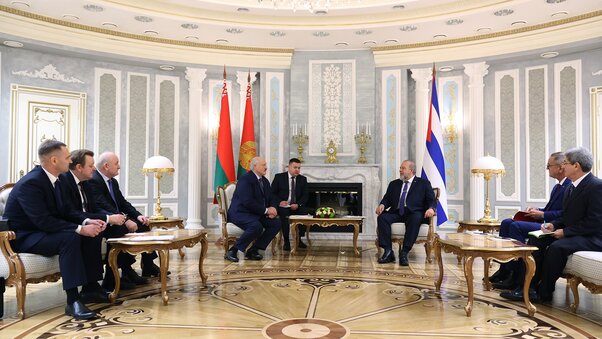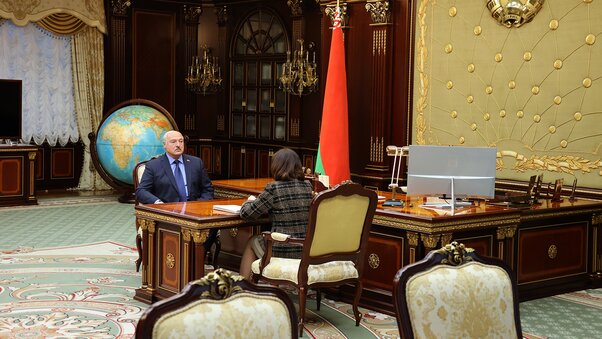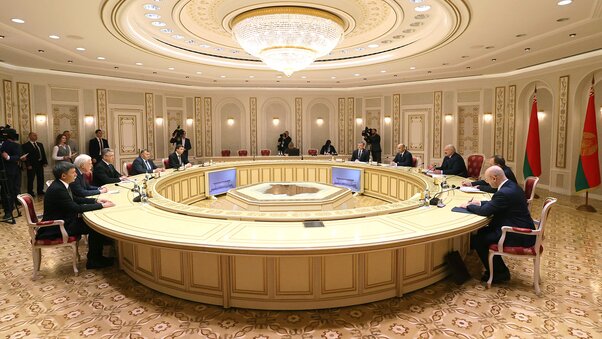Meeting with leaders of political parties
- 11
- 9:02
Belarusian President Aleksandr Lukashenko met with leaders of political parties on 10 November and outlined his stance on the development of the political party system in the country.
The head of state reminded that he announced the plans for such a meeting back in March as he addressed the nation and the parliament: “Back then we agreed that we will meet with leaders of the political parties, which have passed the reregistration process. Three political parties have been reregistered: the Communist Party, the Liberal Democratic Party, and the Republican Labor and Justice Party. A new party has been registered as well – Belaya Rus.”
Aleksandr Lukashenko went on saying: “Let’s be frank, in the course of reregistration we cleansed the playing field of decorative associations and of those, whose efforts are aimed at undermining the foundations of the constitutional system of our country.”
“Belarus is a young sovereign state. The government system we’ve chosen – a Presidential republic – is optimal for our society taking into account historical traditions and the geopolitical location. And specifically because our nation accepts this form of government. People should not just understand it. They should accept it as an axiom,” Aleksandr Lukashenko stated.
The President also noted that essentially extremist groups bent on undermining the statehood had been operating for a long time under the guise of “democratic forms of political participation”.
He stressed that he has nothing against sensible and constructive criticism of various actions of the government. “I don’t mind discussing the problems that exist today, including in a critical manner. I don’t even mind if the authorities are criticized constructively and businesslike for various errors or faults… There are plenty of problems but criticism should be sensible and constructive. For the sake of creation instead of destruction.”
The head of state stated that right now the Belarusian society does not put much trust in political parties. “Not only because of the kind of the nation we have. But also because we have not seriously taken care of development of the political party system. Time will tell. Nevertheless, we have the most important thing: active people, who are willing to participate in the country’s political life and show interest in matters of societal and political development. All of us should work with these people,” he said.
When discussions about the development of the political party system began several years ago, the President formulated one condition: it has to be done exclusively taking into account national peculiarities and specifics of the domestic political process.
“We should not copy all kinds of topics from Soviet history, Russian history. Even more so, we should not copy Western experience. We are not going to recreate the Soviet Union’s Communist Party. We are not building the party of the state. We will not split the society according to party affiliation. We will use positive practices,” the head of state noted.
Continuing the line of thought, he mentioned October Revolution Day that Belarusians celebrate. “It turns out that people may come to like this holiday and we may find meaning in this celebration,” he said.
The President is convinced that Belarusian political parties will be beneficial if they manage to truly represent interests of their members before the state and if they help the government explain the decisions being made.
“Instead of fighting against the state political parties are supposed to compete with each other at the level of projects and legislative initiatives. Everything that is geared towards creation. It should be understood that every decision made at the government level should satisfy all the groups of the population at the same time: public sector employees, the private sector, and pensioners,” Aleksandr Lukashenko stressed.
This is why political parties have to accomplish yet another goal: they are supposed to unite the society instead of disuniting it, particularly in the face of modern challenges and threats. “It is very important for us to be united nowadays. Because the situation is extremely tense, very dangerous. Particularly if we look into the future, at perspectives. Today no one can predict what will happen tomorrow,” the Belarusian leader noted.
“We have to go a long way in the course of developing the political party system. A lot depends on the people, who are present here. The state has enabled the necessary legal conditions. Political parties are granted broad opportunities of participation in the election process,” Aleksandr Lukashenko said.
He also suggested discussing what other organizational measures need to be implemented. “Well, it will be up to you after that. If I have to do something, please tell me. We will work together,” Aleksandr Lukashenko noted.
The President also drew attention to a matter that has become relevant ahead of the forthcoming elections: “I’ve sincerely said that the entire power vertical has been mobilized to organize sensible, neat, and decent parliamentary elections, elections to the Belarusian People’s Congress. Well, and the Presidential election a year later. I want you to also understand that we have another peculiarity: the ongoing change of generations.”
According to the head of state, current leaders should be replaced with young and energetic people but the main task is to preserve the country. “If we falter, trust me that nobody will give us a hand. Everything hinges on us. The world is being redivided. We don’t want to get crushed by the process,” he stressed.
Aleksandr Lukashenko recounted the key factors that contribute to the success of any political party. In his opinion, those include an attractive idea and professional, politically trained people, who are inspired by ideas.
“Particularly now. I know that leaders of the political parties have put forward the initiative of nominating candidates, supporting them, and so on ahead of the parliamentary elections. I just want to advise you: these people should be focused purely on state interests. They should be statesmen like those leaders of the parties that sit in front of me. And they must be professionals. You can gather reliable people around yourselves but if they are not professionals, you will make fools of yourselves and will shame yourselves in front of the people,” the head of state noted.
He stressed that the new parliament will differ from the current one: “I am absolutely sure of it. It will be necessary to handle a bigger workload and play a serious role in the future development of the country. Honestly speaking, I don’t even imagine yet what bigger role you will have to play. You will shoulder everything and will forge ahead in difficult times. Nobody will be able to sit it out. This is why I want you to recommend decent and solid people and support them during this election process. Don’t be afraid that they may be better than you in some regards. It will be only beneficial.”
Discipline is another factor the success of a political party hinges on. Aleksandr Lukashenko urged the leaders of the parties to remember it. “A party without discipline is no party at all,” he said.
“If you can build a system, then you will attract people. If you cannot do it, then no administrative leverage will help you. It will only damage you. Particularly early on,” he added.
“As for my attitude to political parties, which leaders are present here, you are all equal for me. You are patriotic. And I’d like to express my huge gratitude to you, to all the leaders for the position you demonstrate,” the Belarusian leader stressed. “Looking at it, some people say that Lukashenko has once again come up with something special. I was not the one to invent it. We are truly special. We don’t fight with each other over something. Listen, we will always find a place for everyone if we look in the same direction.”
Taking into account the forthcoming election campaign, Aleksandr Lukashenko suggested discussing the participation of political parties in it as well as a vision of perspectives of the political party system development among other things during the meeting.


